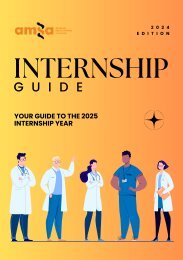Vector Volume 11 Issue 1 - 2017
Create successful ePaper yourself
Turn your PDF publications into a flip-book with our unique Google optimized e-Paper software.
providing surgery are high, investing in surgical<br />
services in LMICs is affordable, saves lives,<br />
and promotes economic growth.[4] To improve<br />
the current conditions, there is a great need<br />
to gather data, identify gaps in data regarding<br />
surgical access, funding and resources, and<br />
monitor progress.<br />
Global surgery in action<br />
Advocacy in recent years has demonstrated<br />
new potential for advancements in global surgery.<br />
Since its establishment in 2015, the LCoGS has<br />
been ground-breaking in demonstrating the<br />
many opportunities for improvements in global<br />
health and global surgery over the next 15 years<br />
and beyond.<br />
Progress has also been made in surgical<br />
safety. For instance, the sustained use of<br />
the “WHO Surgical Safety Checklist” led to<br />
continued improvements in surgical processes<br />
and reductions in 30-day surgical complications<br />
in Moldova, a LMIC, almost 2 years after<br />
its implementation.[6] Such improvements<br />
were seen despite the absence of continued<br />
oversight by the research team, demonstrating<br />
the important role that local leaders play in<br />
the success of quality improvement initiatives,<br />
especially in resource-limited settings.<br />
Moreover, opportunities to address health<br />
inequity and reset the global health agenda<br />
have arisen. These include global commitments<br />
to achieve Universal Health Coverage and the<br />
establishment of the Sustainable Development<br />
Goals. Realisation of the various goals to end<br />
poverty, ensure health for all, and promote<br />
sustainable economic growth, will be more<br />
achievable by ensuring delivery of safe,<br />
affordable and timely surgical care.[1]<br />
However, more improvements can still<br />
be made to further the provision of surgery<br />
worldwide. Currently, a global fund for surgery<br />
does not exist, and only a few foundations<br />
are willing to support surgery. Indeed, it took<br />
decades of advocacy to demonstrate the huge<br />
disease burden of other global health issues<br />
such as HIV/AIDs, tuberculosis and malaria,<br />
and then to develop funding mechanisms for<br />
them. With surgeons and leaders in global<br />
health advocating for patients in LMICs, we can<br />
hope to push for financial support in the coming<br />
years in order to improve the infrastructure and<br />
access to safe surgical care.<br />
In order to improve training and facilitate<br />
sharing of resources, there should also be further<br />
collaboration between hospitals in high income<br />
countries and LMICs (“twinning programs”).<br />
[3] However, donor hospitals, surgeons, and all<br />
those involved in efforts to redistribute surgical<br />
supplies need to exercise due diligence by<br />
ensuring that their partner institutions, including<br />
hospitals, clinics and medical schools, commit<br />
to reaching the poorest populations. Additionally,<br />
it is important to integrate vertical surgical<br />
programs into broader efforts to improve public<br />
health. In doing so, several important questions<br />
need to be raised: how effectively are the<br />
partner institutions providing care? Are they<br />
meeting broader goals of public health and<br />
global health equity?[3,7,8]<br />
Finally, professional interest groups starting<br />
at the level of medical students and residents<br />
can foster interest and educate others about<br />
surgery in a global healthcare setting. One<br />
such entity is the International Student Surgical<br />
Network (InciSioN). This international team of<br />
medical students and young doctors, began as<br />
a small working group within the International<br />
Federation of Medical Student Associations<br />
(IFMSA) in 2014. Since its initiation, members of<br />
InciSioN have been passionately active in global<br />
surgery research, advocacy and education.<br />
Conclusion<br />
Considering the significant economic and<br />
disease burden of lack of access to safe<br />
surgical care, surgery is truly a necessity and<br />
not a luxury. Put simply, essential surgical care<br />
should be made accessible and available<br />
to everyone in the public sector. Whilst the<br />
challenges are huge, progress in global surgery<br />
can be made with patience, determination and<br />
24

















